
Empowering future Navajo leaders through internships in Wááshindoon

Special to the Times | Donovan Quintero
From left to right, Eriona Tapahe, 24, from Fort Defiance, a senior at Utah Valley University; Tiann Barlow, 19, a senior at Northern Arizona University, from Wide Ruins, Ariz., and Taylor Dineyazhe, 19, a sophomore at Yale University, from Gallup, speak about their experiences as interns at the Navajo Nation Washington Office on July 24, in Washington, D.C.
By Donovan Quintero
Special to the Times
WASHINGTON, D.C. – Three possible future leaders of the Navajo Nation recently concluded a 13-week internship program at the Navajo Nation Washington Office, or NNWO.
The interns – Tiann Barlow, 19, a senior at Northern Arizona University, from Wide Ruins, Arizona; Taylor Dineyazhe, 19, a sophomore at Yale University, from Gallup; and Eriona Tapahe, 24, a senior at Utah Valley University, from Fort Defiance — represented the strength and resilience of their communities as they navigated the federal political dynamics in the nation’s capital.
Their time at NNWO was more than just an internship – it was an education in the art of diplomacy and advocacy for Native American rights.
A total of eight interns were not only provided with insights into federal Indian law and policy but they also deepened their understanding of the complex relationship between tribal governance and the federal government.
The NNWO developed a comprehensive curriculum equipping the interns with essential knowledge about the federal trust responsibility owed to Indigenous peoples and the foundational elements of federal Indian law, according to NNWO Executive Director Justin Ahasteen.
Engaging with critical topics
Through a blend of workshops, discussions, and real-world experiences, the interns engaged deeply with critical topics including the historical context of federal relations with Native tribes, key Supreme Court decisions, and their lasting implications for the Navajo Nation.
Ahasteen said he appreciates the work and dedication put forth by the intern during their internships.
“I am proud of our interns’ exceptional work this summer. They played a crucial role in advocating for the Radiation Exposure Compensation Act amendments, Navajo Nation water rights, Missing and Murdered Indigenous People, and tribal gaming,” Ahasteen stated in a text. “Their dedication underscores our internship’s mission to train future leaders in Native American governance. Next summer, new interns can expect to gain hands-on experience, support key initiatives, and contribute meaningfully to our advocacy efforts, reinforcing the federal trust responsibility and tribal sovereignty.”
Tapahe, who is majoring in business management with a minor in American Indian studies, said this is the first internship where she was introduced to Native-related issues, specifically dealing with Navajo Nation related issues.
“It’s been very interesting to be able to firsthand, see what the government-to-government relationship has been like,” said Tapahe.
Giving back to community
Tapahe explained in a statement to support the NNWO internship program, that none of the internship programs she is familiar with provided her with the information she needed to give back to her community.
“This is one of the only internships on Capitol Hill that is catered to Federal Indian Law, Policy, and Governments,” she wrote in the statement.
Barlow said she plans to use the knowledge she gained through her internship experience to go toward law school, which she plans to apply to sometime soon.
“With my goal of attending law school in the future this internship has been an essential part in gaining knowledge,” she said.
Barlow, like Tapahe, said what she learned during her internship at the NNWO helped her better understand the relationship between the U.S. and the Navajo Nation.
“I plan to help create a positive change in the Navajo Nation with public safety and help all the community members,” she said. “Through this internship, I have learned more about the diverse issues that Navajo individuals on and off the Navajo Nation face.”
Dineyazhe described her internship “unique” and “one of a kind.”
“Throughout my internship, I accomplished things like attending both congressional meetings and hearings, writing legislative documents for Navajo Nation tribal leaders,” she said. “I leave this internship a changed person. I leave with new knowledge about the Navajo Nation’s government and their legislative affairs.”
Dineyazhe added that her internship helped her improve her writing skills, collaboration, productivity, and research.
Shaping future Diné leaders
Ahasteen said the internship program is shaping future Navajo leaders. The program’s initiative is not only equipping participants with valuable skills and experiences but also instilling a deep sense of cultural pride and responsibility, he added.
By nurturing and mentoring these aspiring leaders today, Ahasteen said the NNWO’s internship program is laying the foundation for a generation of competent and passionate advocates who will play pivotal roles in leading and advancing their tribe in the years to come.
“The internship program’s emphasis on leadership development and community engagement is set to produce a cohort of dynamic individuals well-prepared to address the challenges and opportunities facing the Navajo Nation in the next decade and beyond,” said Ahasteen.
When the office made the program available, he said they saw that while college students were applying for the internship, they noticed Navajo students were not applying.
After identifying three different factors that might be contributing to Navajo college students not applying for the internship such as costs, transportation issues, and family commitments, Ahasteen said they came up with a solution.
“So, we developed a program where it’s covered completely by our office,” he said. “We provide housing, transportation, and a temporary paycheck for thirteen weeks that would allow them to not worry about anything, everything would be covered.”
Ahasteen said the interns quickly delved into learning about federal trust responsibility, federal Indian law 101, Supreme Court decisions, and how they affect Indian law and policy.
“We taught them how to create a policy brief. We taught them how to develop talking points. We taught them how to sit in on hearings and critically think about how these positions could impact tribal nations,” he said, adding the internship program helps to open ideas on how to protect and promote tribal sovereignty.
Accepting more interns
This year, Ahasteen explained that they accepted more interns when Arizona State University reached out to the NNWO asking if the office could take on more students.
“We thought about it, and we said, ‘OK, we’ll take additional students.’ So, we got additional students from them,” Ahasteen said. “We had three young, talented women, one from Yale, one from Utah Valley University, and one from Northern Arizona University apply.”
Ahasteen emphasized the importance of nurturing and instilling an understanding of how the Washington office works for the Navajo people back home through the internship program.
“Part of the work that we do is making sure that we have a positive relationship with the federal government because most of the funds, about seventy percent of the Navajo Nation funds, is federal dollars,” he explained. “We need to maintain that. We need to look for additional funding opportunities and we need to enhance its increased access to funding. And that’s something we work on, and we continue to work on.”
For Tapahe, Barlow, and Dineyazhe, they said learning about the complex relationship the tribe has with the federal government, tribal governance, and tribal sovereignty, inspired them to push themselves harder so that they can one day come home and start helping their people.
Internship opens doors
Dineyazhe said her time at the NNWO during the 13-week internship program opened many doors for her.
“It has shown me the work that, I, as a Diné youth, can continue to do for my people in the Navajo Nation.,” she said. “I cannot wait to share all that I have learned out here with my community back home and create everlasting changes that will better my community.”
Tapahe, who intends to open a business on the Navajo Nation someday, said before her internship she questioned why the tribe didn’t just get rid of the many red tapes that prevented economic opportunities from easily being created on the Nation.
“I was like, ‘Why can’t we just get rid of it? Like, why is it in place? like, why? Why? Why?’ And so, after this, it’s just really understanding the legislations that are put in just to try and get our economy to grow,” she said. “It’s made me realize how complicated it can be to start a business on the Navajo Nation because of the red tape we face with land leasing, waterlines, and double taxation.”
Barlow said what stuck out to her was the complex process of establishing substance and alcohol abuse centers in the Navajo Nation.
“That has been an issue that stuck out to me for quite a long time,” said the 19-year-old NAU senior. “I researched a lot about how to put these buildings on the Navajo Nation.”
Before his tenure is over at the Washington office, Ahasteen said they want to create a partnership with Diné College and bring Navajo language and cultural classes to the Washington area for the Navajo families.
“We want to be able to provide their kids with a little touch of home,” he said.
And if it’s successful, there might be a Navajo cultural center that Navajos working in Washington, D.C., could one day take advantage of.
The other interns are Carys Brown, Mason Miller, Madeline Yang, and Hunter Rhea – all from Arizona State University, and Joseph Nemec from the University of Tennessee-Knoxville.
For more information on how to apply for the Navajo Nation Washington Office internship program, contact the office at 202-682-7390, or info@nnwo.org.








 Highway 264,
Highway 264, I-40, WB @ Winslow
I-40, WB @ Winslow